 W
WHenry James "Red" Allen was an American jazz trumpeter and vocalist whose style has been claimed to be the first to fully incorporate the innovations of Louis Armstrong.
 W
WEdmund Lincoln Anderson was an American comedian and actor. To a generation of early radio and television comedy he was known as "Rochester".
 W
WGeorgie Auld was a jazz tenor saxophonist, clarinetist, and bandleader.
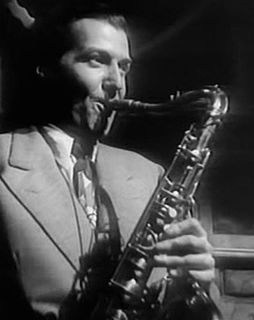 W
WCharles Daly Barnet was an American jazz saxophonist, composer, and bandleader.
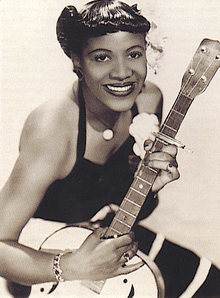 W
WBea Booze, often credited as Wee Bea Booze, was an American R&B and jazz singer most popular in the 1940s.
 W
WConstance Foore "Connee" Boswell was an American female vocalist born in Kansas City but raised in New Orleans, Louisiana. With sisters Martha and Helvetia "Vet", she performed in the 1920s and 1930s as the trio The Boswell Sisters. They started as instrumentalists but became a highly influential singing group during this via their recordings and film and television appearances
 W
WCarl Brisson, born Carl Frederik Ejnar Pedersen, was a Danish film actor and singer. He appeared in 13 films between 1918 and 1935, including two silent films directed by Alfred Hitchcock. In the 1934 film Murder at the Vanities, he introduced the popular song "Cocktails for Two".
 W
WColumbus S. Perry, better known as Piney Brown, was an American R&B and blues singer and songwriter, who has been described as a "fine, big-voiced shouter". He released a string of singles between 1948 and 1988 and issued two albums late in his career. His songs have been recorded by Little Milton and James Brown.
 W
WSolomon Vincent McDonald Burke was an American preacher and singer who shaped the sound of rhythm and blues as one of the founding fathers of soul music in the 1960s. He has been called "a key transitional figure bridging R&B and soul", and was known for his "prodigious output".
 W
WArnett Cleophus Cobb was an American jazz tenor saxophonist, sometimes known as the "Wild Man of the Tenor Sax" because of his uninhibited stomping style. Cobb wrote the words and music for the jazz standard "Smooth Sailing" (1951), which Ella Fitzgerald recorded for Decca on her album Lullabies of Birdland.
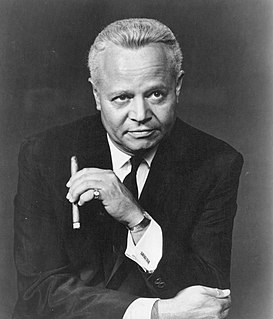 W
WWilliam Boone Daniels, better known as Billy Daniels, was an American singer active in the United States and Europe from the mid-1930s to 1988, notable for his hit recording of "That Old Black Magic" and his pioneering performances on early 1950s television. He was one of the first African-American entertainers to cross over into the mainstream. Daniels was honored with a star on the Hollywood Walk of Fame in 1977.
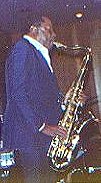 W
WEdward F. Davis, known professionally as Eddie "Lockjaw" Davis, was an American jazz tenor saxophonist.
 W
WThe Dixie Hummingbirds are an influential American gospel music group, spanning more than 80 years from the jubilee quartet style of the 1920s, through the "hard gospel" quartet style of gospel's golden age in the 1940s and 1950s, to the eclectic pop-tinged songs of today. The Hummingbirds inspired a number of imitators, such as Jackie Wilson and James Brown, who adapted the shouting style and enthusiastic showmanship of hard gospel to secular themes to help create soul music in the 1960s.
 W
WWilliam Thomas "Champion Jack" Dupree was an American blues and boogie-woogie pianist and singer. His nickname was derived from his early career as a boxer.
 W
WRaymond Eberle was a vocalist during the Big Band Era, making his name with the Glenn Miller Orchestra. His elder brother, Bob Eberly, sang with the Jimmy Dorsey Orchestra.
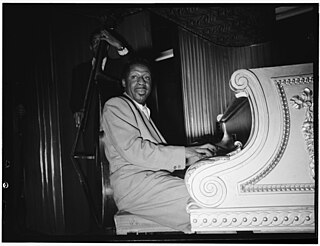 W
WErroll Louis Garner was an American jazz pianist and composer known for his swing playing and ballads. His best-known composition, the ballad "Misty", has become a jazz standard. Scott Yanow of Allmusic calls him "one of the most distinctive of all pianists" and a "brilliant virtuoso." He received a star on the Hollywood Walk of Fame at 6363 Hollywood Blvd. His live album, Concert by the Sea, first released in 1955, sold over a million copies by 1958 and Scott Yanow's opinion is: "this is the album that made such a strong impression that Garner was considered immortal from then on."
 W
WBabs Gonzales, born Lee Brown, was an American bebop vocalist, poet, and self-published author. His books portrayed the jazz world that many black musicians struggled in, portraying disk jockeys, club owners, liquor, drugs, and racism. "There are jazz people whose influence can be described as minor," wrote Val Wilmer, "yet who are well-known to musicians and listeners alike ... You'd have to be hard-pressed to ignore the wealth of legend that surrounds Babs Gonzales." Jazz writer Jack Cooke explained that Gonzales "assumed the role of spokesman for the whole hipster world... [becoming] something more than just a good and original jazz entertainer: the incarnation of a whole social group."
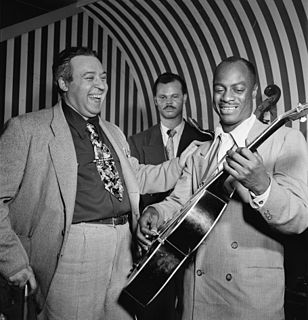 W
WLloyd "Tiny" Grimes was an American jazz and R&B guitarist. He was a member of the Art Tatum Trio from 1943 to 1944, was a backing musician on recording sessions, and later led his own bands, including a recording session with Charlie Parker. He is notable for playing the electric tenor guitar, a four-stringed instrument.
 W
WWynonie Harris, was an American blues shouter and rhythm-and-blues singer of upbeat songs, featuring humorous, often ribald lyrics. He had fifteen Top 10 hits between 1946 and 1952. Harris is attributed by many music scholars to be one of the founding fathers of rock and roll.
 W
WColeman Randolph Hawkins, nicknamed "Hawk" and sometimes "Bean", was an American jazz tenor saxophonist. One of the first prominent jazz musicians on his instrument, as Joachim E. Berendt explained: "there were some tenor players before him, but the instrument was not an acknowledged jazz horn". Hawkins biographer John Chilton described the prevalent styles of tenor saxophone solos prior to Hawkins as "mooing" and "rubbery belches." Hawkins cited as influences Happy Caldwell, Stump Evans, and Prince Robinson, although he was the first to tailor his method of improvisation to the saxophone rather than imitate the techniques of the clarinet. Hawkins' virtuosic, arpeggiated approach to improvisation, with his characteristic rich, emotional, loud, and vibrato-laden tonal style, was the main influence on a generation of tenor players that included Chu Berry, Charlie Barnet, Tex Beneke, Ben Webster, Vido Musso, Herschel Evans, Buddy Tate, and Don Byas, and through them the later tenormen, Arnett Cobb, Illinois Jacquet, Flip Phillips, Ike Quebec, Al Sears, Paul Gonsalves, and Lucky Thompson. While Hawkins became well known with swing music during the big band era, he had a role in the development of bebop in the 1940s.
 W
WJalacy "Screamin' Jay" Hawkins was an American singer-songwriter, musician, actor, film producer, and boxer. Famed chiefly for his powerful, operatic vocal delivery and wildly theatrical performances of songs such as "I Put a Spell on You", he sometimes used macabre props onstage, making him an early pioneer of shock rock. He received a nomination for the Independent Spirit Award for Best Supporting Male for his performance in the hit indie film Mystery Train.
 W
WEarl Kenneth Hines, also known as Earl "Fatha" Hines, was an American jazz pianist and bandleader. He was one of the most influential figures in the development of jazz piano and, according to one source, "one of a small number of pianists whose playing shaped the history of jazz".
 W
WMahalia Jackson was an American gospel singer. Possessing a contralto voice, she was referred to as "The Queen of Gospel". She became one of the most influential gospel singers in the world and was heralded internationally as a singer and civil rights activist. She was described by entertainer Harry Belafonte as "the single most powerful black woman in the United States". She recorded about 30 albums during her career, and her 45 rpm records included a dozen "golds"—million-sellers.
 W
WJean-Baptiste "Illinois" Jacquet was an American jazz tenor saxophonist, best remembered for his solo on "Flying Home", critically recognized as the first R&B saxophone solo.
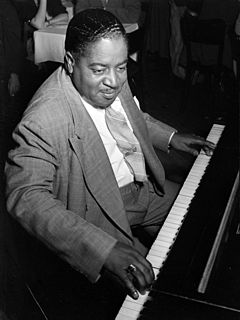 W
WPete Johnson was an American boogie-woogie and jazz pianist.
 W
WJohn Kirby, was a jazz double-bassist who also played trombone and tuba. In addition to sideman work, Kirby is remembered for leading a successful chamber jazz sextet in the late 1930s and early 1940s, which scored several hit songs including "Loch Lomond" and the debut recording of "Undecided", a jazz standard.
 W
WSamuel Levenson was an American humorist, writer, teacher, television host, and journalist.
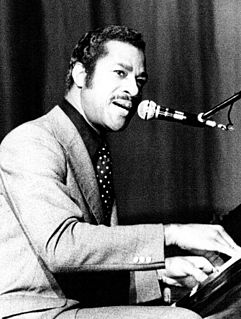 W
WWillie James Mabon was an American R&B singer, songwriter and pianist, who had two number one hits on the Billboard R&B chart: "I Don't Know" in 1952 and "I'm Mad" in 1953.
 W
WAlbert Gordon MacRae was an American actor, singer and radio/television host, who appeared in the film versions of two Rodgers and Hammerstein musicals, Oklahoma! (1955) and Carousel (1956), and played the leading man of Doris Day in On Moonlight Bay (1951) and sequel By The Light of the Silvery Moon (1953).
 W
WOran Thaddeus "Hot Lips" Page was an American jazz trumpeter, singer, and bandleader. He was known as a scorching soloist and powerful vocalist.
 W
WHarrison Franklin Reser was an American banjo player and bandleader. Born in Piqua, Ohio, Reser was best known as the leader of The Clicquot Club Eskimos. He was regarded by some as the best banjoist of the 1920s.
 W
WAbe Schwartz was a well-known klezmer violinist, composer, Yiddish theater and ethnic recordings bandleader from the 1910s to the 1940s. In his various orchestras, he recorded many of the leading klezmer musicians of the early twentieth century, including Naftule Brandwein and Dave Tarras.
 W
WDinah Washington was an American singer and pianist, who has been cited as "the most popular black female recording artist of the '50s". Primarily a jazz vocalist, she performed and recorded in a wide variety of styles including blues, R&B, and traditional pop music, and gave herself the title of "Queen of the Blues". She was a 1986 inductee of the Alabama Jazz Hall of Fame, and was inducted into the Rock and Roll Hall of Fame in 1993.
 W
WJoshua Daniel White was an American singer, guitarist, songwriter, actor and civil rights activist. He also recorded under the names Pinewood Tom and Tippy Barton in the 1930s.